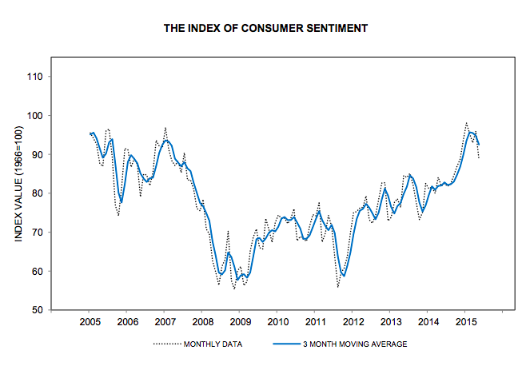Earlier this week, we told you about concerns over retail sales. On Friday, there was another surprise indication that the economy might be faltering.
Consumer sentiment fell in May by the biggest decline in more than two years, according to Bloomberg.
The University of Michigan, which measures consumer confidence, said its preliminary index of sentiment dropped to 88.6, the lowest since October. The index stood at 95.9 in April.
The 7.3 point decrease was the largest for a single month since December 2012. The outcome was lower than the lowest estimate of 68 economists surveyed by Bloomberg.
Richard Curtin, director of the Michigan Survey of Consumers, said the decline was widespread among all age and income subgroups as well as across all regions of the country.
He said it doesn’t indicate a downturn in housing purchases or consumer spending. Instead, Curtin thinks the data indicates a “reluctant acceptance on the part of consumers that economic growth will remain near the same lackluster pace recorded during the past several years.”
If you translate that, it means that consumers are gloomy, even though they might be buying cars and houses. However, if they’re concerned about the future, they might hold back on those purchases, too.
Consumer confidence data is one of the key underpinnings that auto companies gauge for the future health of their sales (the others are housing and unemployment).
The consumer confidence survey is an easy one for journalists to report on. Talk to customers at businesses across your area, talk to business owners and local economists for their forecasts.












